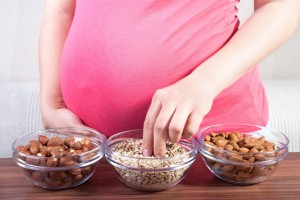Anemia is the most common hematologic disease that may encounter future mother during her «interesting situation».During pregnancy, a number of significant physiological changes occur with the woman’s body, among them a gradual increase in blood plasma volume. This is necessary to meet the metabolic needs of the mother and fetus. In this regard, the need of the female body for iron and other nutrients that are used in the synthesis of hemoglobin and red blood cells is increasing.
Gestational anemia is usually mild and cannot significantly affect the course of pregnancy. It is also called «physiological anemia». However, reserves may not be enough for the ever-growing needs of the fetus in the mids of amid chronic nutritional deficiencies. And then the body can no longer cope with the production of the required number of red blood cells in proportion to the increase in plasma volume.
Symptoms of anemia
Gestational anemia is manifested by constant fatigue and shortness of breath, which appears even after minor physical exertion. In more severe cases, anemia can interfere with the oxygen supply to the unborn baby. Other signs of anemia include pallor, tachycardia, and hypotension (low blood pressure). If anemia progresses, the risk of preterm birth and postpartum infection increases significantly.
Causes of Anemia
Anemia occurs primarily in the second and third trimester of pregnancy. The most common causes are deficiency of iron and folic acid, vitamin B12. Indeed, for the production and maturation of red blood cells, these very components are of the greatest importance. And if the food is poor in vitamins and trace elements necessary for erythropoiesis, then the hemoglobin content and the number of red blood cells in the blood are reduced. As a result, we have a decrease in the ability to transport oxygen.
Iron, in particular, serves for the synthesis of hemoglobin, so it must be in the diet in adequate doses to maintain a normal concentration of this protein. Iron deficiency is the most common cause of anemia during pregnancy and is associated with an increased risk of premature birth and и low birth weight babies.
Risk factors for anemia during pregnancy:
- multiple pregnancy;
- poor and unbalanced nutrition;
- short period between two pregnancies;
- young age of the future mother (teenager);
- heavy menstrual bleeding before pregnancy due to the presence of uterine fibroids;
- smoking (reduces the absorption of essential nutrients);
- excessive alcohol consumption;
- use of anticonvulsants.
At the slightest concern do not hesitate to ask your doctor. Remember that the doctor is your best friend during pregnancy.

















